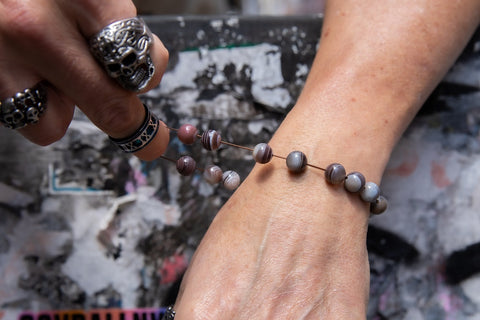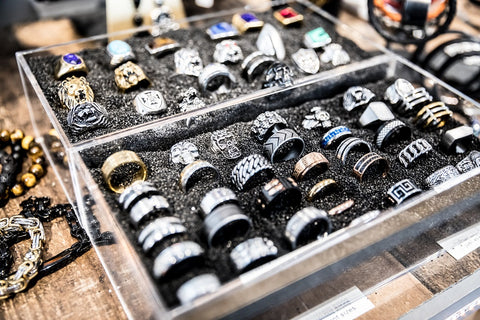5 Reasons to Shop Small Businesses
Across the United States, there are 28.8 million small businesses which account for 99.7% of all licensed businesses, a striking figure and one which makes clear the spread of such businesses. Yet, even with such popularity, one has to ask: what are the main reasons to shop at small businesses?
There are many businesses that bring about benefits to the consumers and the communities. Out of the multiple reasons to shop at small businesses, the top five include the sustainability received, as well as access to more flexible products and more creative designs. Behind that, you gain a personal connection with small businesses that's simply not possible with large businesses, and as a result, you get better customer service in all regards no matter where you are in your purchasing decision. Finally, working with a small business brings about a sense of community and the knowledge that you are helping local businesses to make an impact.
1. Sustainability. When you shop small business websites or offices, you are contributing to a more sustainable form of business. Small brands and businesses have fewer employees which mean fewer levels of management. Smaller companies like this won't have to lay people off when things start to tighten and instead can keep the business operating just as efficiently. With fewer levels of management, decisions can be made quickly. Working much closer to customers provides an infant understanding of what brings about customer satisfaction on behalf of the business and are you as the customer you can understand how the company works. You get to learn when they make changes, why they make changes, what their policy is on sustainability as well as social responsibility programs. If you, for example, want to buy fashion accessories such as jewelry for natural stones, it's important to know that the company with whom you work with is a sustainable one and they aren't simply mining gemstones with no thought to the social, economic, and environmental impact on the ground. Smaller companies can be much more transparent about these policies.

This level of sustainability is paramount in a time where mass production is reaping significant detriment on the environment.
Consider this: When you purchase a single one time use coffee drink you might not realize it but the materials needed to create that container you throw away after finishing your beverage has to be mined from the ground which costs money, takes energy, and has a negative impact on the environment. From there a great deal of energy goes into taking the raw materials, perhaps aluminum, and making them into the container from which you drink.
But the consumption doesn't stop there. Cold beverages have to be refrigerated at every step thereafter from the moment they are filled until they are transported to their final location. Even being sold in stores they have to be maintained in special refrigerators that cost companies more money to maintain a stable temperature. When transported from one place to another, the cost for the containers, the electricity, and the simple transportation fees add up very quickly.
Unfortunately, one-time-use products are not necessarily fully recyclable which means that at best only part of the container can be recycled and reused while the rest end up in a landfill. But the problem is that most people don't actually recycle these containers. When a recycling bin is nowhere to be found, but a trash can is right there, most people will settle for the trash can reluctantly disregarding the negative impact this has on the environment.
Smaller companies have found ways to be more sustainable, smaller companies have the freedom to focus on more creative endeavors that cut these costs, in some cases finding materials that are more easily recyclable so that the impact on the environment is reduced. When you support small businesses you support this level of creativity and by extension, sustainability.

2. Access to More Flexible Products. Small businesses are often more independent. This originality, creativity, and variety are seen less and less often in a world where large stores/brand names are becoming homogenized. This type of variety and originality is particularly important for industries like fashion. It is at small businesses that innovation takes place and propels the industry forward.
If, for example, you shop small business ventures in the fashion industry, you can directly support fashion innovation and perhaps contribute to the newest trends, latest quality work, and more. It is only with independent, small businesses that you are offered choice. Large businesses cannot produce a wide variety of choice. Their bottom line simply doesn't support this nor to their stakeholders. But with smaller businesses they have the freedom thanks to customers like you to create and form that freedom they can offer more choices so that you and every other person on your block are not forced to wear the same item. Instead, you get to express who you are as a person while your neighbor up the street expresses who they are with completely different fashion accessories.

Consider this: Large companies particularly those that sell fashion accessories or clothing, have very specific items that come their way on a regular basis. These are mass-produced and once they are out of season and the next batch of items is en route, you can't get them again. They won't make them again, they won't necessarily sell them again, and if you need a replacement order or an exchange, you won't have access to those items.
But with smaller businesses, there is more control over what is offered. You won't walk into a small boutique in your city and find the exact same items that are sold across the neighboring five cities. But if you walk into a large brand name store you could end up walking away with the same purchases as every other person in your state if not the country. This makes it significantly harder to express yourself through fashion.
Small businesses have considerably better control over their output and concurrently better control over their interactions with clients compared to larger organizations. This provides a distinct advantage as smaller organizations are better able to make changes to their strategies. They can make changes and be flexible when something is no longer sustainable, or when demand shifts such that customers suddenly want something new. Products can be brought to the marketplace much faster when the creation of new accessories, for example, are overseen by only a handful of people. By comparison with larger companies, there are so many people in the processes involved in that product development stage which means that it takes longer for issues to be uncovered and subsequently corrected before the final product can be released. Smaller businesses can get this turnaround done quickly. This brings with it the added benefit of risk minimization and the ability to adapt products according to any feedback as it comes in.

3. Personal Connections With small businesses, be it fashion boutiques or jewelry stores, there is a bond that is created with customers, one that molds itself into a pseudo-familial bond, one step beyond a cut and dry professional one.
You get a better customer experience brought about by sustainable fashion. When you shop small businesses you are able to cultivate that close, personal connection to the business. Small businesses have more frequent dealings with their customers compared to larger ones. A small business, for example, can meet with a customer regularly and figure out what it is they like most, what they value in the fashion they wear, what fashion accessories might be considered special by the customer, and therefore what items the small business can start offering. Larger businesses invest a great deal of money trying to replicate the natural, intimate connections that small businesses come by honestly with our customers. Moreover, larger companies are faced with significant layers of red tape, procedures that prevent close contact, and the inability to make customers feel as valued or as understood.

When you meet with small businesses regularly, if they don't have something you want or need, they are usually significantly more receptive and willing to order what it is you want or need if it's within their capacity. This is not a level of service you can as easily get from a large business.
Consider this: If there is a particular gem that you want in a piece of jewelry, one that is symbolic for you and your family and, is something that you will be giving away as a gift, if you ask the large company whether they have it and they don't, they will tell you they don't have it. That will be the end of the transaction. You will have to settle for something else.
By comparison, you could want that same gem in a piece of jewelry and the small business you visit doesn't offer it but they can order it especially for you. That type of service is simply something that is allowed with small businesses. Their operations just allow for more flexibility, the freedom to simply order an individual gem from their distributor so that they can make a specific piece of jewelry for you. The red tape and multiple departments associated with large businesses completely for Hibbetts this type of personalized service.

4. Customer Service Small businesses are run by people just like you, not by algorithms or stockholders. This means the care and quality received is vastly different from that of large companies. In fact, small companies see their work as a reflection of who they are, so rather than pushing just to make it into the next market or raise new capital, they focus on the details of what they already offer, and how they can make it better for you.
Working with a small business means that customer complaints are handled quickly and more importantly, they are rectified using a personal touch. A large business, for example, might try to fix a processing mistake with your order by giving you a replacement order with no extra shipping when all you really wanted was the acknowledgment of the issue and an apology or perhaps a new item, or a small free gift rather than no extra shipping on the replacement. When you have a long-term professional relationship with a small company make it know these nuances and in particular what things you prefer. Having a clear understanding of your personal preferences allows customer service to take on a whole new meaning.

Consider this: If you order a product from a large, name-brand company and you call the customer service line for help, you don't realize it but even though the company could be operating locally the customer service line is operated nationally. This means they have multiple facilities across the states where hundreds of employees work for minimum wage and are chained to their desks figuratively, fielding one call after another after another with no more than 30 seconds in between each incoming call when things are busy.
So you call in with a local question, and that person can't answer why there was an issue locally because they don't have access to that information. The only thing the customer service department has at this large company is a list of what the company policies are and a script telling them what lines to say next.
The representative with whom you speak is never going to be the same person twice. If you could just be connected and you call back you get fielded to someone else, the next available representative who could be based in a different state or even a different country. So you have to start all over again when you explain the problem. And it doesn't matter who you talk to because the solution they offer is going to be the only solution that they are allowed to offer. You won't get any personalized details or assistance.
By comparison, when you call a customer service line for a small business you talk to John or Janice, two locals who live in your area and get paid a decent wage with full benefits and have more freedom and flexibility to get up and down from their desks. They are not only happier but they know that you know who they are personally or at least you will be engaging with them each time you call so they go out of their way to stay a little bit nicer and to find more personalized solutions to your problems rather than the same representative working for a large company.
Consumers get to feel a sense of community. In fact, a recent study found that small businesses create a strong sense of community. Larger companies might invest thousands of dollars in social media campaigns in order to engage with clients but smaller companies can send coupons detailing about upcoming events like small business Saturdays where one Saturday per month you get special deals by shopping with small businesses. The specificity involved in information shared across marketing platforms by small companies it's able to encompass that personalized feeling; it will literally feel like it's just a friend talking to you over social media and not a big business.
5. Making an Impact While sustainability is important, so is social responsibility with sustainable fashion. Today people are more and more aware of what they buy, from whom, and how that item came to be. People won't settle for buying shoes or clothes or jewelry without knowing where the products came from, where they were manufactured and what the conditions were in that manufacturing plant. Customers want to shop near places that have a real effect on their communities. They want to feel as though the local business actually cares about the neighborhood. Moreover, small businesses actually help ground neighborhoods by keeping that personal connection and maintaining that sustainability.
Consider this: On average, 48% of every purchase you make with a small business gets recirculated locally. By comparison less than 14% of every purchase you make it a chain store finds its way back into your community. But the impact isn't just on the environment. Small businesses since 1990 have added eight million jobs while big businesses during that same timeframe have eliminated four million jobs. Therefore the more you patronize small businesses the more potential job opportunities you are helping to create. By helping a local business you might, with the help of other consumers in the town, create a handful of new jobs which gives out of work individuals in your community reliable income and benefits, something those big businesses wouldn't offer.
Part of that personal connection that's made with small businesses and that transparency is what encourages authenticity in small businesses. Small businesses don't just operate out of communities, they are part of those communities so what they do and the impact their business has is going to be seen one way or another. And given the fact that so many small businesses are run by genuine people just like yourself, those people are conscientious and they want to make sure that their business has a positive impact no matter where the community might be.
All of these benefits discussed apply to small businesses of each and every type. There are small businesses that function as physical boutiques in your local town, there are others that are offered in multiple locations that are still run by individuals and not corporations. And then there are those from whom you can make your purchases online. Plenty of small businesses have fully functioning websites that allow people to access all of their products no matter where they live, even if the physical Boutique is not in town. And the nice thing about this is those small businesses operating online give more people access to supporting sustainable fashion, companies that care about social responsibility, while still providing that same level of personal connections and enhanced customer service that is naturally associated with small businesses.
So how can you help support small businesses
Shopping small brings myriad benefits and it's something you can do every day. Most people think of small business Saturday is the day when they make a conscientious effort to shop at small businesses but you can go to your local corner store or anything you need be at groceries, car parts, or fashion accessories.
Other things you can do to encourage small business successes to share things on social media. If you have a small business yourself or you are shopping at a small business, write positive reviews for them on local sites like Yelp. Post pictures or status updates with the appropriate small shop hashtags and something positive about your experience.

Make the most of local loyalty programs for small businesses. While you're at it, look at the official small business Saturday website and find your local business map so that you can figure out which businesses you should visit next weekend and then visit the same small business Saturday Facebook page to get more involved and to share status updates their pictures from your experience at local businesses.
Keep apprised of local goings-on by visiting the Small Business Administration page and reading up on ways you can get involved in Small Business Saturday events in your local community and continue to promote sustainable fashion and better customer experience.



